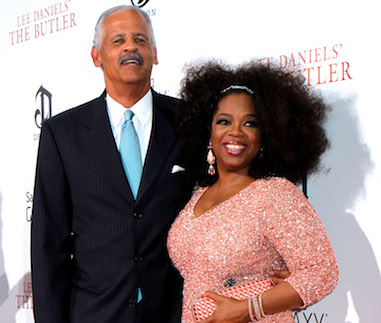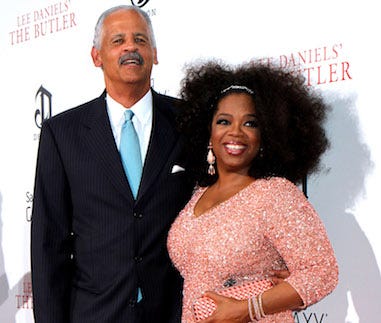Counseling & Therapy for Individuals, Couples, & Families in Little Rock, AR. Find out when therapy is indicated, Becky's … Learn More
Power struggles: What to do if one spouse is more successful than the other.

Oprah and Stedman
Put two people in a room and they’re going to compare themselves to one another other – that’s what humans do. The same is true of two people who are married, each looks at the other and decides who’s the best, the strongest, smartest, nicest, who does the most – ugh – power struggles are inevitable. That’s why marriage therapists know that the more evenly balanced a couple is in beginning, the more likely their marriage is to succeed.
We therapists think of these areas where couples compete or compare as areas of power. For example, beauty is power. So is money. And who has the most of any of these things is likely to be perceived as having more power. Here are a few more areas where power struggles show up:
• Age
• Education
* Family of origin
• Health
• Success
• Intelligence
• Energy level
• Confidence
• Bowling score (Just kidding, but if you are way better at one skill than your spouse, it conceivably could be an issue).
Being as evenly balanced as possible is important because then we won’t have to deal with things like fear, envy, jealously and resentment because of what your spouse has that you don’t. Example: If Suzette is prettier than I am and has more money and success, I might feel envious of her and worry that she’ll leave me for what I consider to be a higher quality mate. I also might resent her for the positive strokes she gets in her life while I get little or no acknowledgement at all. This is how power trouble starts in relationships.
Success is a common area where couples experience an imbalance of power. Here’s a few common combos that put relationships at risk:
• One-sided. He has it and she doesn’t.
• Flip-flop. They both had it but one person loses it. The other person gets it.
• One-sided shifts to balance. He has it, she eventually gets it, and he can’t cope with her new-found success.
What the real destructive issue is, is lack of self-confidence and self-esteem in one or both of the partners. If you have a woman who knows who she is, feels good about herself, and feels empowered to do or not do whatever she wants, she will be able to deal with a more successful husband and vice versa.
For those that don’t have self-confidence and self-esteem, what are you waiting for? I implore you to dig in and do what it takes to feel good about you and your life. Passionately pursue something that intrigues you – go to school, start a business, become a writer or photographer, mechanic, cosmetician or whatever you find interesting and satisfying. Feeling good about yourself is the anecdote to comparing yourself negatively to your successful partner. B for yourself in case the marriage doesn’t work out.
Now, a word to the successful spouse …
The biggest issue I see with successful spouses versus the spouse who either stays at home or makes less income, is that they get territorial about the fruits of their success … some tend to refer to the money in the bank account as “my money,” or make comments such as, “Who do you think bought this nice house we’re living in?” Another destructive doozy is, “If we get divorced you’ll have to go back to living in a cheap apartment” or “Without me you’d still be living with your parents.” These sorts of remarks do show up often in my marriage therapy practice and I assure you will have no positive outcome and should never be said.
Anytime you say something to your partner that is even a smidge demeaning, threatening or dominating, it will not help them feel good about themselves and it will make you look like an overlord and bully, so don’t do it. Once said, these sorts of ugly words are never forgotten and will sow major seeds of resentment.
If you are the more successful partner in your relationship, take the Stedman and Oprah approach: Stedman has his own successful career and must know he will never make as much money as Oprah, but he has enough self-confidence to be OK with himself and what he does to not to be threatened by her success. As for O, you can bet she doesn’t rub his nose in it and never thinks of herself as better than or more worthy of a person than he is. I think it takes a special person to be in Stedman’s position, but it takes a classy, not-defined-by-her success, humble person to still see a guy like Stedman as her equal and to treat him as such. Those two types of comfortable-in-their-own-skin, OK-as-is personalities are hard to find.
The bottom line of dealing with the I-am-more-successful-than-you situation in marriage is to never use your power against your partner; always treat them as your equal; understand that your worth is inherent, comes from the inside and not from what you do, have or who you know; and to always support and cheer your partner on in whatever they choose to make of their life. Love who you love, as is.

Power struggles: What to do if one spouse is more successful than the other.
Power struggles: What to do if one spouse is more successful than the other.
Share on Facebook Share on Twitter Share on Google+ Share on Pinterest

Put two people in a room and they’re going to compare themselves to one another other — that’s what humans do. The same is true of two people who are married, each looks at the other and decides who’s the best, the strongest, smartest, nicest, who does the most — ugh — power struggles are inevitable. That’s why marriage therapists know that the more evenly balanced a couple is in the beginning, the more likely their marriage is to succeed.
We therapists think of these areas where couples compete or compare as areas of power. For example, beauty is power. So is money. And who has the most of any of these things is likely to be perceived as having more power. Here are a few more areas where power struggles show up:
• Age • Education * Family of origin • Health • Success • Intelligence • Energy level • Confidence
• Bowling score (Just kidding, but if you are way better at one skill than your spouse, it conceivably could be an issue).
Being as evenly balanced as possible is important because then we won’t have to deal with things like fear, envy, jealously and resentment … all because of what your spouse has that you don’t. Example: If Suzette is prettier than I am and has more money and success, I might feel envious of her and worry that she’ll leave me for what I consider to be a higher quality mate. I also might resent her for the positive strokes she gets in her life while I get little or no acknowledgement at all. This is how power trouble starts in relationships.
Success is a common area where couples experience an imbalance of power. Here’s a few common combos that put relationships at risk:
• One-sided. He has it and she doesn’t. • Flip-flop. They both had it but one person loses it. The other person gets it.
• One-sided shifts to balance. He has it, she eventually gets it, and he can’t cope with her new-found success.
The real problem for the couple at the end of the day is lack of self-confidence and self-esteem. If they had it they would be able to deal with anything. For those that don’t have it and feel lesser than, what are you waiting for? I implore you to dig in and do what it takes to feel good about you and your life. If you don’t have something that you feel passionate about, find it. What intrigues you? Go to school, start a business, become a writer or photographer, mechanic, cosmetician or whatever you find interesting and satisfying. Feeling good about yourself and having something you’re excited about is the antidote to comparing yourself negatively to others.
Now, a word to the successful spouse, the one who may feel better than …
The biggest issue I see with successful spouses versus the spouse who either stays at home or makes less income, is that they get territorial about the fruits of their success … some tend to refer to the money in the bank account as “my money,” or make comments such as, “Who do you think bought this nice house we’re living in?” Another destructive doozy is, “If we get divorced you’ll have to go back to living in a cheap apartment” or “Without me you’d still be living with your parents.” These sorts of remarks show up too often in my marriage therapy practice and I assure you they will have no positive outcome and should never be said.
Anytime you say something to your partner that is even a smidge demeaning, threatening or dominating, it will not help them feel good about themselves and it will make you look like an overlord and bully, so don’t do it. Once said, these sorts of ugly words are never forgotten and will sow major seeds of resentment.
If you are the more successful partner in your relationship, take the Stedman and Oprah approach: Stedman has his own successful career and must know he will never make as much money as Oprah, but he has enough self-confidence to be OK with himself and what he does to not to be threatened by her success. As for O, you can bet she doesn’t rub his nose in it and never thinks of herself as better than or more worthy of a person than he is. I think it takes a special person to be in Stedman’s position, but it takes a classy, not-defined-by-her success, humble person to still see a guy like Stedman as her equal and to treat him as such. Those two types of comfortable-in-their-own-skin, OK-as-is personalities are hard to find.
The bottom line of dealing with the I-am-more-successful-than-you situation in marriage is to never use your power against your partner; always treat them as your equal; understand that your worth is inherent, comes from the inside and not from what you do, have or who you know; and to always support and cheer your partner on in whatever they choose to make of their life. Love who you love, as is.
Originally published at marriagecrisismanager.com on August 30, 2016.

Has your wife has checked out of your marriage?
Has your wife has checked out of your marriage?
Share on Facebook Share on Twitter Share on Google+ Share on Pinterest

When your wife turns her back on your marriage you can be sure your problems are serious.
Roger is 45 and called to make an appointment. “My wife has changed overnight,” he says. “And she won’t come in to therapy. Help me, what should I do?”
As an experienced marriage therapist, I’m thinking, “She might be having an affair,” and when I ask the husband if she is, he says, “I really don’t think so. She says she isn’t.” At this point I think, “Sounds like he may be in denial, but maybe not …”
Love affairs cast an emotional speIl on people, and when they become infatuated with someone else their behavior will change suddenly. In the cases where isn’t an affair and a wife’s behavior changes, you can be sure she has at least reached a point where she has decided to turn her back on the marriage due to frustration and disillusionment with her husband. She may have made requests of him that have been ignored, waved and danced around trying to get his attention on improving the marriage, and has now given up. When this happens, there are numerous signs that will indicate her shift. Here is what to look for:
- She starts doing activities away from the marriage that don’t include you. She is seriously unhappy in the relationship but not ready to leave. She tells herself that she can exist in the unhappy marriage so long as she disconnects and does her own thing as much as possible. This could be new friends, a new lifestyle, an affair, going back to school, trips alone, new activities like exercise, bicycling, yoga.
- Her attitude is no longer respectful. She used to treat you with kindness and consideration, but now she doesn’t bother. She may make snide or sarcastic remarks, and stop editing herself with you and around others.
- She is less cooperative. She used to be helpful and accommodating. Now not so much: “Pick up your own take-out food,” Bucko, “And while you’re at it, I will no longer be responsible for taking your mother to the doctor.”
- She speaks brutal truths. You know how nice I’ve been to your family all of these years?” she says. “Well, the truth is I hate them all, and I hate you, too. I hate your shoes, and the way you hold the newspaper and slurp your coffee in the morning.”
When your wife starts acting in these ways, your married days are numbered. Sometimes it is too late to stop the marital deterioration at this point, but many other times a marriage can be saved with a good Marriage and Family Therapist, especially if your spouse is not emotionally involved with someone else. It depends on your individual situation and the history of your relationship. One thing is for sure, however, if your spouse starts distancing, you had better wake up and hear what she has been trying to tell you or your marriage will end. Distancing always signals her loss of hope for the relationship she has with you, and she’s just going through the normal human process of disconnecting.
Originally published at marriagecrisismanager.com on August 30, 2016.



 Becky Whetstone is an Arkansas native and has a Ph.D. in Marriage and Family Therapy from St. Mary’s University in San Antonio, Texas. She is a Licensed Marriage and Family Therapist (LMFT) in Texas and Arkansas.
Becky Whetstone is an Arkansas native and has a Ph.D. in Marriage and Family Therapy from St. Mary’s University in San Antonio, Texas. She is a Licensed Marriage and Family Therapist (LMFT) in Texas and Arkansas. 





















































































































